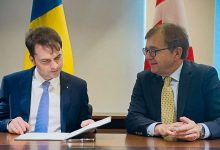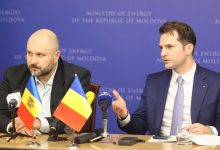Russia’s politic, energy and geostrategic games with R. of Moldova: Is there a way out?
Republic of Moldova’s dependence of Russian gas and energy, as well as the complicated issue of Transdniestria, make Chisinau even more vulnerable to political and economic pressures coming from Moscow or indirectly from Gazprom. Republic of Moldova does not have its own proven gas reserves and meets its gas needs by importing natural gas from Russia. In 2016, the consumers in the Republic of Moldova received some 3 billion cubic meters of Russian gas. Overall, Moldova can cover only about one fourth of its energy needs, mostly electricity.
If this picture needs being completed, let’s say that the Moldovan-Russian relations are strained, due to the geostrategic games played by Moscow in terms of energy and political pressure. To this it adds the eagerness of President Igor Dodon to forge closer relations with Moscow, at any cost, while the Moldovan government and the parliament would rather bet on getting closer to the EU.
R. of Moldova depends 90% on Russian gas, based on a contract signed in 2011 and renewed every year since 2011, now due in 2019. The natural gas prices were of about USD 200 per thousand cubic metres in 2015 (due to lower price of oil and gas on international markets) but were of about USD 400 per thousand cubic metres during 2010-2015.
Romanian gas supply would be a solution, but the Iasi – Ungheni gas pipeline project extension to Chisinau is going slow. During the recent joint Romanian – Moldovan government sitting in late March in Piatra Neamt, the prospects were analysed. PM Sorin Grindeanu said the project could be completed before 2019, Moldovan PM Pavel Filip eyes the end of 2018 – thus, still work to do… Works are ongoing at the Issaccea-Vulcanesti interconnection and then the extension to Chisinau, feasibility studies are completed, next is the technical design. According to sources, the overall costs for the southern connection and the pipeline to Chisinau could rise to EUR 300 million.
So, Moldova remains dependent on Russia energy sources, mainly on gas, while the debts for the gas supply are increasing rapidly. During his first visit to Moscow in January, after winning the elections in late 2016, Moldovan President Igor Dodon had officially admitted to the Transdniestria debt for gas as being R. of Moldova’s, so that the overall debt of Chisinau would be of no less than USD 6.5 billion. “The debt for the right bank of Dniester River is only USD 500 million, however the left bank has a debt of USD 6 billion. We have to understand the total debt of USD 6.5 billion is Moldova’s,” Igor Dodon said, stirring the outrage of Moldovan opposition. His explanation: Gazprom does not divide the debt between Transdniestria and Moldova. After meeting Gazprom’s Alexey Miller in Moscow, Igor Dodon assured the Moldovans that the Russian giant will supply gas to Moldova, irrespective of the transit situation in Ukraine. In his efforts to forge better relations with Moscow and Russian President Vladimir Putin, Dodon said that after the next general elections in Moldova he hopes to cancel the association agreement with the EU.
At the middle of March, Gazprom and Moldovagaz, represented by Alexey Miller, Chairman of the Gazprom Management Committee, and by Vasile Botnari, Chairman of the Board of Directors of Moldovagaz, carried out talks in Moscow on further cooperation. The parties discussed the ongoing and future activities of Moldovagaz and cooperation between the companies. Let’s note that Moldovagaz is a joint Russian-Moldovan company set up by Gazprom, the Moldovan Government, and the Ministry of Industry of Transdniestria. In December, Gazprom renewed its contract with Moldovagaz for the supply and transit of gas across its territory for three years.
And yet… two days later news surfaced that Gazprom had sued Moldovagaz in February to Russia’s International Commercial Arbitration Court demanding the payment of USD 768.6 million for the natural gas supplied in 2014. It is the third time the companies will face off in court. Gazprom sued Moldovagaz twice in a Russian arbitration court over debts from 2012 and 2013. Moldovagaz owed Gazprom USD 562.3 million for 2013 and over USD 800 million for 2012. The court ruled in Gazprom’s favour both times. The last ruling was made in September 2016.
Meanwhile, the Moldovan authorities are trying to find alternatives. In early March the government signed an agreement with the US company Frontera Resources, which is to conduct explorations for oil and gas for five years and, if it succeeds, it would exploit the resources for 45 years. The exploration is expected to take place on one third of Moldova’s territory, namely between the localities of Ungheni and Basarabeasca, involving investments of about USD 6 million, up to USD 50-100 million if successful. Frontera Resources is an international company for exploration and production of oil and gas resources, was set up in 1996 and aims at identifying opportunities on emerging markets in Eastern Europe near the Black Sea area.
Analysts say Moscow has no current interest to turn the Moldovan energy sector upside down, as it depends 50 to 90% on Russia for gas and electric power. The same sources say it aims at keeping Chisinau at bay and any attempt to unite the country (with Transdniestria) would stir economic pressures.
Nevertheless, the Moldovan – Russian relations are rather strained. In early March, Moldovan authorities notified Moscow on the abuses committed against MPs, government officials, politicians and intelligence officers entering the Russian Federation. According to the note, the Moldovan officials were abusively stopped, interrogated and searched, and were “humiliatingly treated by the representatives of the Russian special services. Such behaviour is both inadequate and unjustified,” the note reads.
Parliament Speaker Adrian Candu and PM Pavel Filip summoned the Russian ambassador Farit Muhametshin in this regard. According to Chisinau, the actions have got amplified as Moldovan investigators announced they have made progress in investigating the laundering of some USD 22 billion through Moldinconbank, money from the Russian Federation, reportedly after the request addressed to Russia to provide information about the source of the money. Allegedly part of the money was meant to bribe Moldovan MPs. And yet, President Dodon claimed the events are accidental, placing himself on the Russian side and hoping, maybe, to influence the Russian administration to put an end to such procedures.
President Dodon’s efforts to improve the relations with Russia continued, as on March 21 he addressed a letter to the President of the Supreme Eurasian Economic Council, Almazbek Atambaev, requesting the status of observer to the organisation – seen as the mean to partly revive the late USSR.
His efforts may be in vain or at least partly inefficient. Russia’s political approach to Moldova, analysts say, is methodical and a time-consuming game with the nerves of Chisinau – economic embargo still to be completely lifted, the presence of Russian troops in Transdniestria, the abuses against officials, dependence on Russian gas. The reasons are most likely related to Moldova’s strategic position and to its ‘nerve’ to attempt closer ties with the European Union.
Relevant or not, the latest developments show arrogance. In his second visit to Moscow in late March, Igor Dodon was to meet Russian President Vladimir Putin. He had to wait in the antechamber from 13.00h to 17.00h – no less than four hours. It surely is a sign Dodon’s efforts to improve the bilateral relations are far from enough from the Russian point of view.






